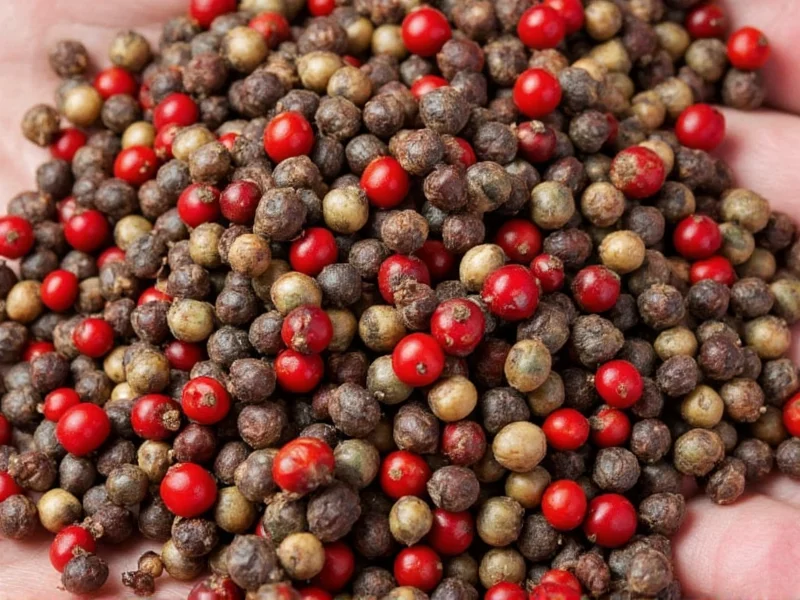Peppercorns, the dried berries of the Piper nigrum plant, have been valued for both culinary and medicinal purposes for thousands of years. Beyond their familiar role as a seasoning, these small spheres pack a surprising nutritional punch that makes them worthy of regular inclusion in a balanced diet.
Nutritional Profile of Peppercorns
While used in small quantities, peppercorns contain valuable compounds that contribute to their health-promoting properties. The key active component is piperine, which gives black pepper its characteristic pungency and accounts for many of its health benefits.
| Nutrient | Per Teaspoon (2g) | Daily Value % |
|---|---|---|
| Calories | 8 | 0.4% |
| Dietary Fiber | 0.5g | 2% |
| Manganese | 0.1mg | 4% |
| Iron | 0.2mg | 1% |
| Vitamin K | 2.5mcg | 2% |
Science-Backed Health Benefits of Peppercorns
Enhanced Nutrient Absorption
One of the most significant health benefits of peppercorns is their ability to increase the bioavailability of other nutrients. Piperine, the active compound in black pepper, has been shown to increase the absorption of key nutrients including:
- Curcumin (from turmeric) by up to 2,000%
- Vitamins A and C
- Selenium
- Beta-carotene
- Coenzyme Q10
This makes peppercorns particularly valuable when paired with other nutrient-dense foods, answering the common question about how peppercorns improve nutrient absorption.
Powerful Antioxidant Properties
Peppercorns contain numerous antioxidants that help combat oxidative stress in the body. Research published in the Journal of Agricultural and Food Chemistry identified multiple antioxidant compounds in black pepper that neutralize free radicals, potentially reducing the risk of chronic diseases. These antioxidant effects contribute significantly to the health benefits of peppercorns for overall wellness.
Digestive Health Support
For centuries, traditional medicine systems have used peppercorns to support digestive function. Modern research confirms that piperine stimulates the production of hydrochloric acid in the stomach, which improves digestion and reduces issues like bloating and gas. This explains why many people wonder is pepper good for digestion—the evidence suggests it is, in moderate amounts.
Anti-Inflammatory Effects
Chronic inflammation is linked to numerous health conditions, and peppercorns may help mitigate this issue. Studies indicate that piperine can inhibit inflammatory pathways in the body. While not a replacement for medical treatment, incorporating peppercorns into your diet may contribute to an anti-inflammatory eating pattern that supports long-term health.
Potential Concerns and Considerations
Digestive Sensitivity
While peppercorns support digestion for most people, some individuals with sensitive digestive systems may experience discomfort. Those with conditions like GERD, ulcers, or IBS should monitor their tolerance to black pepper. This addresses the common concern about peppercorns side effects for sensitive individuals.
Medication Interactions
Piperine's ability to enhance nutrient absorption extends to certain medications as well. It may increase the absorption of drugs like blood thinners, antihistamines, and some antidepressants. If you're taking prescription medications, consult your healthcare provider about how much pepper is healthy for your specific situation.
Quality Matters
Not all peppercorns offer the same benefits. Freshly ground black pepper contains significantly more piperine than pre-ground pepper that has been sitting on the shelf. For maximum health benefits, purchase whole peppercorns and grind them as needed. This consideration is important when evaluating peppercorns vs other spices health benefits.
Incorporating Peppercorns Into Your Diet
Adding peppercorns to your meals is simple and versatile. Here are practical ways to enjoy their health benefits:
- Grind fresh pepper over roasted vegetables
- Add to salad dressings and marinades
- Mix with turmeric in golden milk recipes
- Sprinkle on soups and stews
- Combine with other spices in rubs for proteins
For optimal benefits, pair peppercorns with turmeric-rich dishes, as the piperine dramatically increases curcumin absorption. This synergy makes the combination particularly valuable for those seeking natural anti-inflammatory solutions.
Peppercorns Compared to Other Pepper Varieties
While black peppercorns are most common, other varieties offer similar benefits with slight differences:
- White pepper: Made from ripe peppercorns with the outer layer removed; milder flavor but similar piperine content
- Green pepper: Unripe peppercorns; contains slightly less piperine but more essential oils
- Pink pepper: Not true pepper (from a different plant); offers different compounds but lacks piperine
When considering are black peppercorns good for you specifically, they generally contain the highest concentration of piperine compared to other pepper varieties.
Conclusion
Peppercorns are indeed good for you when used as part of a balanced diet. Their ability to enhance nutrient absorption, provide antioxidant protection, and support digestive health makes them a valuable addition to your spice cabinet. While they shouldn't be considered a miracle cure, the scientific evidence supporting their health benefits is substantial. As with any food, moderation is key—using peppercorns in typical culinary amounts provides benefits without significant risks for most people. Understanding the peppercorns nutritional value helps you make informed choices about incorporating this ancient spice into your modern diet.
Frequently Asked Questions
How much pepper should I consume daily for health benefits?
For health benefits without potential side effects, 1/4 to 1/2 teaspoon of freshly ground black pepper daily is sufficient. This amount provides enough piperine to enhance nutrient absorption while staying within safe consumption levels for most people.
Can peppercorns help with weight loss?
Some research suggests piperine in peppercorns may support metabolic function and fat breakdown, but peppercorns alone won't cause weight loss. They can be part of a healthy diet that supports weight management when combined with proper nutrition and exercise.
Are there any risks to consuming too many peppercorns?
Excessive consumption (several tablespoons daily) may cause digestive irritation, heartburn, or nausea in sensitive individuals. People with ulcers, GERD, or inflammatory bowel conditions should be particularly cautious with large amounts of black pepper.
Do different colored peppercorns have different health benefits?
Black peppercorns generally contain the highest piperine concentration. White pepper has similar benefits but slightly less piperine. Green peppercorns offer different essential oils but less piperine. Pink peppercorns (not true pepper) provide different compounds and lack piperine's specific benefits.











 浙公网安备
33010002000092号
浙公网安备
33010002000092号 浙B2-20120091-4
浙B2-20120091-4